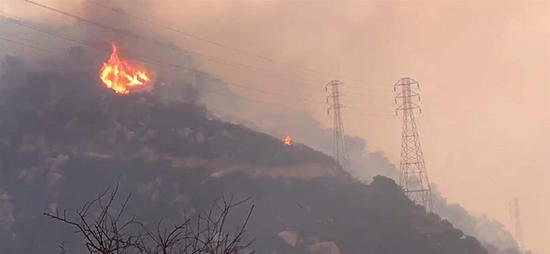Utility Power Shutoffs and the Medically Vulnerable

Photo: Mike Eliason/Santa Barbara County Fire Dept.
During potentially dangerous weather conditions in fire-prone areas, utility companies like Southern California Edison (SCE) may call for a Public Safety Power Shutoff (PSPS). During a PSPS, utility providers turn off power in high-risk areas to reduce the threat of wildfires and protect the safety of both the public and utility employees. During the most recent wildfire event in Northern California, Pacific Gas and Electric (PG&E) shut off power to portions of 34 of the state’s 58 counties, which affected more than 1.5 million people — more than 30,000 of whom are part of a program called Medical Baseline, requiring special energy needs to address their medical conditions.
Medically-vulnerable customers may require immediate access to backup energy sources for critical medical needs and require more advance notice. Utilities are providing programs to assist income restricted and medically fragile customers through PSPS and other unforeseen events. Through Medical Baseline financial assistance, SCE offers customers who rely on powered medical equipment reduced power rates. During a PSPS event, SCE will also automatically contact Medical Baseline customers with a pre-recorded telephone message warning them of the impending event.
As of this week, more than 72,000 SCE customers have signed up for a reduction on their bill through the program. A subset — about 16,000 — are customers who fall into a “critical care” category, which means their equipment is critical to their care and well-being. Examples include residents with powered wheelchairs, ventilators, refrigerators for medicine, dialysis machines or other equipment.
Because there is an unknown number of other Californians that may be medically fragile and reliant on electricity, SCE encourages customers to report their critical medical needs by applying for the program. Additionally, individuals discharged from hospitals who newly require use of a qualified medical device should be notified about Medical Baseline financial assistance. A newly-discharged patient requiring powered medical equipment may be eligible for an additional 16.5 kWh per day above their normal baseline allocation through Medical Baseline.
To be eligible for Medical Baseline, individuals must live full time in their residence and require the use of a medical device. The program also accepts paraplegics, hemiplegics, quadriplegics, multiple sclerosis or scleroderma patients, individuals who require air conditioning, and people with life-threatening illnesses or compromised immune systems.
Individuals who qualify are encouraged to call Southern California Edison at (800) 447-6620 or apply for Medical Baseline at www.sce.com/residential/assistance/medical-baseline.
Contact:
Adam Blackstone
(213) 538-0761
ablackstone@hasc.org



